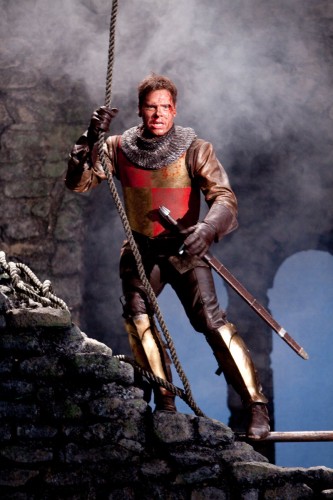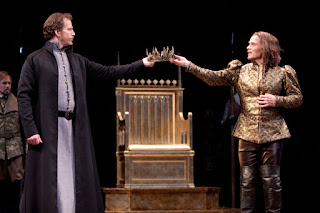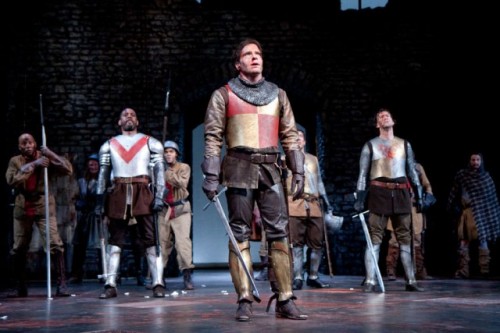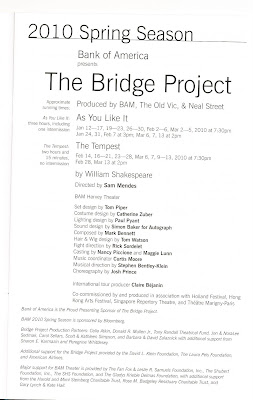6 and 7

The Leadership Repertory
Sydney Harman Hall, Washington D.C.
These productions were unique because of Michael Hayden, who played both Richard and Henry, alternating night to night. It was a spectacular feat, as he did not only memorize the plays, but he also acted exceptionally well. The two plays, taken as a whole, were less impressive, as most of the parts were less strongly cast than the title figures, conveying their characters with actions instead of their words. Though it is said that actions speak louder than words, when performing some of the greatest texts of all time, projection is essential. There was little projection and many slurred their words, though there were a fair number of exceptions. It played to their disadvantages that the set was bare, so they had to really sell it with their words. David Muse directed Henry and Michael Kahn directed Richard. Muse did not make use of the active plot, where he used almost no props, and didn't have anyone run around the stage. Kahn, though Richard is a less active play, had Richard and Bolingbroke stride around the stage. These "leadership" plays got a lot of hype in DC, as it is a political center, and although in Henry, Shakespeare shows the great glory of a successfull leader and politician, Richard torments the mind of many, displaying the pains of failure.

Henry V

Richard II and Bushy
Michael Hayden (King Richard II/King Henry V)
Hayden was better as Richard, as he portrayed the slimy, cowardly qualities and the brave hatred equally well. But although he was very good at becoming slightly insane, he lacked the texture that a certain predecessor (Derek Jacobi) had. Richard discovers himself, unwrapping his layers like a Christmas gift, and being pushed farther and farther each time. But there are many ways to play the part and some may view Jacobi as ’temperamental’. As Henry he was more like an action hero, which is the role, but still isn’t as powerful or expansive. Henry is like one lane, where as Richard is the whole alley, and any one person may choose his lane. Compare to Branagh Henry V?

Henry Bolingbroke and Richard
 Derek Lee Weeden (Northumberland/Exeter)
Derek Lee Weeden (Northumberland/Exeter) He was a very powerful low-voiced kind of actor. He was stereotypical, but this didn’t take away from his performance, it just made it, well, stereotypical. His booming lies resounded throughout the hall. His big frame and large shoulders made him all the more terrifying in battle, where he was king of the field in Henry V. He may have been the most solid character in the entire play.

From left. Soldier, Henry, Exeter
Tom Story (Aumerle/Dauphin)
As Aumerle, he was good at appearing like a front runner. He was always shifting like a Chameleon. It gave him a very slimy air, which coupled by his bull’s eye depiction of true cowardice, was very effective. He almost over did it as he was pardoned by Henry IV, where he hugged his mother and almost cried into her arms. But he really shone as Dauphin, always the first to brag and talk trash, but the last to truly act on his words.
Darren Matthias (Mobray/Pistol)
He was good as Mobray, because though it is a small part, he has great lines. He said them with such passion you actually believed him. But he was fantastic as pistol, sharp and ruthless, but kind and loving underneath. He was a very good pistol because he looked scruffy but wasn’t really when closely looked upon.

Scott Whitehurst (Green/Michael Williams)
Though he had small parts, he played them well. Once an arrogant lord playing king of the hill, next an obedient soldier, shy in the presence of a king. What made him so good was the contrast between his two characters. I hope he the chance to play more lengthy roles in the future.
Patrick Vaill (Gloucester’s servant/Boy)
One speech, one chance, one brilliant performance. Though having only 25 lines or so, he was extremely effective when he talked about leaving Pistol and company and faring for himself. He showed how hard it was growing up with thieves, getting no education and no training, and then having to find a way to get through life without committing a crime of some sort. This is a real dilemma.

The Cast from left: Michael Williams, Exeter, Henry, York
![[Monkey-typing.jpg]](https://blogger.googleusercontent.com/img/b/R29vZ2xl/AVvXsEiyvUG_Fmlw8fy1B5iVumYUlisPFJwqSNmBConxdy5UbbV-RNe0Pqfnk9CAmiLB_kxP6h0M5QKfMu2jrA-c91ZebTwLQwBNO_NMeKEu1VGWlEyJD2gIJhE78ipvpNAjIQQBYPCVOdu-eOy3/s1600/Monkey-typing.jpg)














